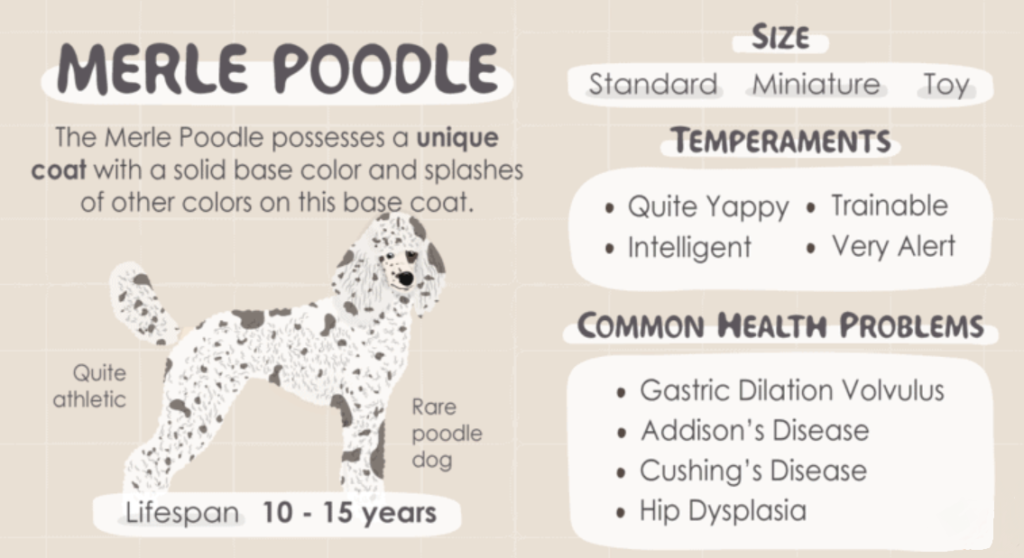Introduction
Merle Poodles in the UK are gaining popularity because of the various amazing and unique coat patterns. Generally, a Poodle is known to be intelligent and elegant, and the Merle Poodle adds that extra flair with speckled or dappled coats. This comes with responsibilities: not only must one understand the genetics of the breed but also the health considerations as well as proper care.
Here, we shall look at the UK realm of Merle Poodles and provide information for interested owners as well as
| Table of Contents |
|---|
| What is a Merle Poodle? |
| History of Merle Poodles |
| Genetic Considerations and Health Issues |
| Merle Poodles Coat Colors and Patterns |
| Caring for Your Merle Poodle |
| Training and Socializing a Merle Poodle |
| Ethical Breeding Practices for Merle Poodles |
| Merle Poodles in the UK: Legal and Ethical Aspects |
| Popularity and Demand for Merle Poodles in the UK |
| Final Thoughts on Merle Poodles in the UK |
What is a Merle Poodle?
Merle Poodles are a variant of the standard poodle breed. The main difference they exhibit, however, is in the coat that is full of striking mottled colors. These colors in the coat are caused by the Merle gene that breaks up the undercolouring with white patches of lighter fur. Although existing in Australian Shepherds and Border Collies as well, this gene has recently entered the poodle breeding system through cross-breeding only.
These dogs can be bred to any size, which includes the standard, miniature, and toy. However, all Merle Poodles are characterized by the marbled or patchwork effects of their coat. Notice that Merle is not a natural coat color, nor is it found in purebred poodles, but was bred to become so popular through designer breeding.
History of Merle Poodles
The history of Merle Poodles in the UK is a very recent one. For ages, Poodles have been known for their intelligence, trainability, and hypoallergenic coats. But the introduction of the Merle gene into the poodle population has created many debates within the breeding community regarding ethics and health.
The Merle pattern originated on herding dogs, however gained popularity due to its aesthetic merits and was consequently introduced to other breeds also, such as poodles. Merle Poodles have gained popularity through their unique look but, simultaneously, have become a source of controversy because of their potential health issues, which may be linked to the Merle gene.

Genetic Considerations and Health Issues
.The Merle gene, although visually appealing, carries risks in genetics. It is very dangerous to breed Poodles as Merle; it cannot be bred to another Merle-coated dog. Further, in the “double Merle,” this often results in disastrous results of perhaps being deaf and blind, or even suffering from physical deformities of all kinds.
Any ethical breeder will always consider genetic testing seriously to ensure that the litters they produce are healthy. If you plan on having a Merle Poodle, make sure that a serious breeder is taking precautions and not irresponsible breeding that may harm the dog.
Merle Poodles Coat Colors and Patterns
Merle pattern is not one color but several shades that can be different for a dog to another. Some Merle Poodles are predominantly light with dark patches, while others have relatively well-balanced spotting. More common base colors for Merle Poodles are blue, black, chocolate, and red that are often intermixed with lighter or darker markings.
In addition to having very striking coat color and patterns, Merle Poodles often also display very striking eye color. The latter can include blue or heterochromatic – that is, where each eye a different color. These add to an already unique appearance and may be why popularity in the UK is now increasing.

Caring for Your Merle Poodle
Care of a Merle Poodle is a little more than normal grooming. The coat may be a beautiful sight to see, but it is a high-maintenance item. Regular brushing is a must to avoid mats, and every six to eight weeks you will need to take him to a professional groomer.
Beyond grooming, their health and well-being need to be worked on. Merle Poodle, like any other type of poodle, is an energetic and intelligent canine with mental stimulation needs and requires exercise. Any kind of daily walk can be supplemented by an interactive play or a puzzle toy to keep your Merle Poodle feeling happy and healthy.
Training and Socializing a Merle Poodle
Merle Poodles are very intelligent, just like other Poodles, and might be among the most trainable breeds around. In addition to obedience and agility, they can serve for service work. Early socialization really goes a long way in helping them mature to become well-behaved adult dogs. Positive reinforcement is the best way to train Merle Poodles since they live by praise and rewards.
Socialize your Merle Poodle to many other dogs and other people from a very young age so they learn to be confident and not a stranger to anything at all. It makes them great fun to train, be it for simple commands or even more complex tricks, since they will do just about anything to please you.
Ethical Breeding Practices for Merle Poodles
Even as Merle Poodles gain popularity, proper ethical breeding practice also has to be stressed. Since the Merle gene is introduced by cross-breeding, any responsible breeder would have to place animal welfare above all. Responsible breeding does not entail genetic testing, proper vet care, and avoiding two Merle-coated dogs for breeding.
Well-educated purchases should be made at the hands of buyers who make sure that they are purchasing from ethical breeders whose dogs treasure health and longevity over aesthetics.
Merle Poodles in the UK: Legal and Ethical Aspects
Dog breeding is governed by a range of legislation in the UK for the protection of animal welfare. There is growing attention to Merle Poodles as their popularity increases, especially in the context of the health hazards that the Merle gene may pose. At worst, plainly unethical breeding practices can, at times, run afoul of animal welfare law.
In all these aspects, potential owners should be well-equipped with the legal requirements that surround the purchase of a Merle Poodle. They should buy from reputable breeders of such dogs who observe and ensure all local regulations and guidelines.
Popularity and Demand for Merle Poodles in the UK
Recently, Merle Poodles gained popularity due to their not-so-common appearance and the popularity of the breed as a whole. Social media, for one, helps increase demand from the viral show of images of these striking dogs.
However, it has also given easy ways to dishonest breeders to easily cash in on the fuss over pet rearing. For that reason, finding a good and responsible breeder while assuring your dog chosen is healthy is much more important these days.
Final Thoughts on Merle Poodles in the UK
Of course, Merle Poodles are pretty beautiful and appealing dogs. However, keeping such a dog demands knowledge of what responsibilities one must have for raising such a unique breed as a Merle Poodle. Ethical breeding, proper care, and proper socialization must be the top priorities for the owner so that the dog would lead an entire, happy, and healthy life. Considering a breed, one should be careful enough to make sure not to support cruel breeding or harm his dog’s health
FAQs about Merle Poodles
1.What is the Merle gene?
The Merle gene causes light patches of fur to balance dark patches with dilutions of the dogs’ base color.
2. Are Merle Poodles pure breed?
Merle is not a natural colored poodle breed. It is introduced through cross breeding.
3. Do Merle Poodles have a higher predisposition for health problems?
On the other hand, if two Merle-coated dogs are bred together, these puppies may have a greater risk for more health problems because of the “double Merle” effect, which throws forward puppies with more serious defects.
4. How do I know if the breeder is trust-worthy?
Look for breeders who have had genetic testing done, avoid breeding two Merles, and focus more on their dog’s health than their appearance.
5. How often should my Merle Poodle be groomed?
They need regular grooming. Brush them daily and periodically take them to a professional groomer every six to eight weeks.
6. What sizes do Merle Poodles come in?
As is the case with poodles in general, Merle Poodles come in standard, miniature, and toy sizes.
7. Do Merle Poodles show in the ring?
That depends on the kennel club. Some kennel clubs do not recognize Merle Poodles as standard and hence do not permit them to show.
8. Are Merle Poodles hypoallergenic?
Yes, just as all poodles, Merle Poodles are hypoallergic, meaning they do not cause allergic reaction in people.
9. Do Merle Poodles do well in apartments?
Yes, as long as they are exercised and mentally stimulated, Merle Poodles will thrive well in apartment settings.
10. How can I socialize my Merle Poodle?
Get them used to people, places and other dogs from an early age
Conclusion :

Lifespan
12 – 15 years

Size
Small / Toy Breed

Weight
4 – 6 LBS

Height
Up to 10 inches

Colors
Black, gray, white, brown, sable, silver, blue, fawn, cream, or red

Size of home
Adaptable to various living situations. They can thrive in apartments, small homes, and larger homes with ample space

Exercise
Moderate; 15-30 minute daily walks and play

Grooming
High; daily brushing and regular professional grooming


Pingback: Merle Poodles Information : Everything You Need To Know - Merle Poodle
Pingback: Merle Poodles Stud Service : A Complete Guide
Pingback: Merle Poodles Stud Service : A Complete Guide – My Blog